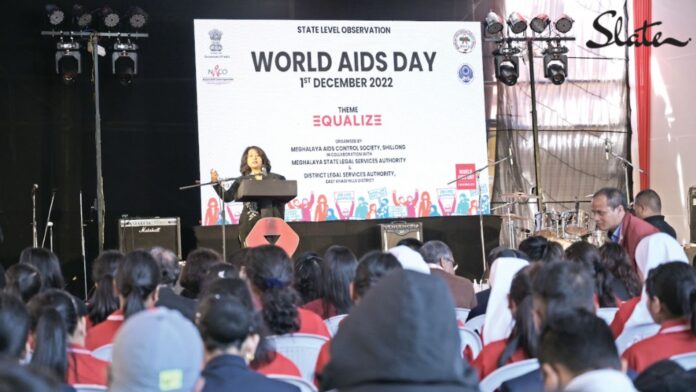By Abha Anindita
As the world continues to put up a tough fight against HIV/AIDS, the bigger challenge that needs to be addressed is linked to the stigmas and taboos surrounding the disease.
HIV is a virus that damages the immune system of the body, thereby making the infected person prone to several other deadly diseases.
The state of Meghalaya endures this lifelong disease as it sits on the boundary with 7018 registered cases as of October 2022, according to the Meghalaya AIDS Control Society (MACS). With as many as 3718 patients receiving treatment in the state at the moment, the question of the moment is – how well-equipped is the state’s health infrastructure?
Meghalaya remains one of the states that is struggling with the epidemic and MACS has doubled down on strategies for the battleground. Media reports suggest that in the year 2021, every three out of 1000 women in Meghalaya tested positive for the virus.
HIV can be transmitted outside of sexual contacts, such as through sharing needles or drug equipment, or from a mother to her baby. Due to the mother serving as a potential carrier for the baby, screening of pregnant women is now mandatory in the state.
“We are conducting mandatory testing of pregnant women in the state in a bid to avoid transmission to the children. If the mother gets tested early and follows the treatment, there are chances that the virus will not be transmitted to her baby,” informed Dr B Decruse, Project Director, MACS.
MACS is also focusing on counselling before and after the test if the results are positive for pregnant women.
While certain groups called the high-risk groups have a greater chance of contracting the virus, it can be transmitted to anyone, regardless of their gender, ethnicity, or sexuality.
The high-risk groups are the people that are most vulnerable to the virus. Decruse said these include sex workers, gay men, injecting drug users and transgenders. The MACS has a dedicated programme called the Target Intervention Project that is implemented through non-governmental organisations (NGOs) that are carefully chosen by them.
Deputy Director (Target Intervention), W. Dohling said, “The focus is to avoid transmission between high-risk groups and also to avoid the spread to the general population.”
The virus is majorly transmitted through unprotected sex, the use of same needles, syringes and blood transfusion. As unprotected sex serves as the biggest carrier of the virus, high-risk groups such as the sex workers are often at the receiving end of it.
Dohling stated, “We are trying to identify the possible carriers and conducting tests at regular intervals through NGOs. For the identified sex workers, we do a screening process once every six months. The idea behind this is if you are negative, you should remain negative.”
The bigger battle the state needs to fight is against the myth and taboos surrounding the virus. Negative notions surrounding the disease hold people back from getting themselves tested, as people who test positive are generally shunned by the society. This leads to many suffering in silence.
“The myths and taboos can only be fought by spreading awareness, and that’s why we are trying to expand our work on that as much as possible. We are trying to organise village level awareness campaigns. Radio jingles and making the youth more aware are some areas we are exploring,” informed Assistant Director (Mainstreaming), MACS, Ajoy M. Lanong.
He added, “The only antidotes to stopping the spread of virus are awareness about using protection, steering clear from using drugs with the same needles or drugs in general for that matter, and avoiding having multiple sex partners.”
The virus does not have a cure yet, but it can be suppressed if identified at the right time. The increase in testing is also a step towards the right direction.
“We are promoting testing in the sub centre levels, including mobile testing vans. The test hardly takes time and one can get the report on the same day,” Decruse said.
She added, “The visible symptoms usually include fever for a long period of time, or sudden weight-loss. It basically ruins your immune system making you prone to several other diseases. Therefore, it is advised to get yourself tested when you engage in unprotected sex with any unknown person. The earlier it is detected, the better.”
As an organisation, MACS is focusing on counselling especially for high-risk groups and encouraging them to get themselves tested.
“This involves mass-sensitization through grassroots which include headmen, inducing behavioural changes towards people who have tested positive, and letting patients know of their responsibilities and rights. We will soon be on the other side,” added Decruse.
Being humans with infinite flaws, people are quicker to judge others than to understand them. In case of HIV/AIDS, that judgement becomes manifold. As myths and taboos reign supreme, there seems to prevail a pandemic in the shadows – no sound, no noise, only the piercing silence.


